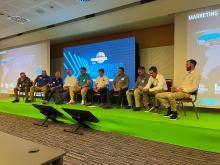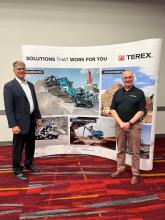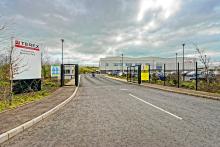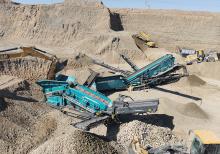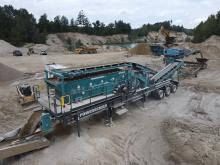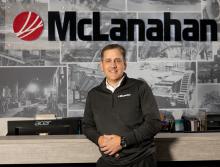The Powerscreen World Dealer Conference saw nearly 400 Powerscreen dealers, customers and staff from all over the globe gather in Varese, near Milan in northern Italy, from 19-21 September to learn about next-generation machines and linked technology from the Terex Materials Processing (Terex MP) business brand. The major event also featured live quarry demonstrations of the new machines, dealer best practice and feedback sessions, and several longtime successful Powerscreen dealers were recognised for their exceptional work in a special awards evening. In an exclusive interview, Guy Woodford sat down with Sean Loughran, Powerscreen’s business line director, during the triennial conference to learn more about the brand’s latest news and ambitious plans.
“We’ve been through some difficult years, and the brand identity had been disorientated for quite some time. That might seem inconsequential to some people, but it is really important to us. That’s what we build the business on,” says Sean Loughran, getting straight to the heart of what he believes is key to Powerscreen realising its exciting growth plans in the global crushing and screening and linked solutions market.
Loughran is joining me after addressing a large conference room packed with the Terex MP brand’s dealers, customers and staff on the second day of the Powerscreen World Dealer Conference.
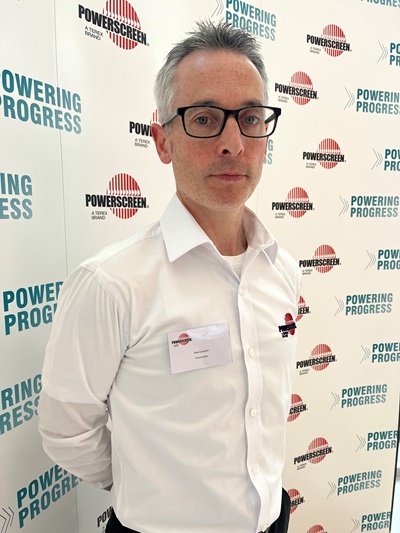
“We needed to rekindle our strong brand identity and get my team fully focused on supporting Powerscreen dealers. That’s our USP (unique selling proposition); no one else has a distribution network like ours,” he stresses. “We’ve got dealers who’ve worked for Powerscreen for over 50 years, who were with us in their teens. They are in their seventies and came through our factories and established dealerships in New York, California, Florida and many other places throughout the world. It’s a unique legacy and history that we need to nurture and develop. We started that process three years ago and have made significant progress. The dealers have noticed that the spark and interaction between them and my team is back to how it was.”
Powerscreen has over 100 dealers globally who provide local service and support to end users in more than 80 countries.
Loughran says that the closer relationship between Powerscreen dealers and his business line team helped steer the brand through the myriad challenges created by the COVID-19 pandemic, including supply chain disruption and materials inflation. “We had to do many price increases for machines already sold but were still awaiting dispatch. We had a significant order backlog and had to price that to stay in business. It shows how the team and dealers rekindled their strong relationship, and my team’s strength and commitment in walking dealers through that.”
The lack of engine availability from one prominent manufacturer was a major issue for Powerscreen during COVID-19. “It would have been a showstopper if we didn’t have an amazing engineering team that developed, unprecedently quickly, alternative [machine] designs that could accommodate engines from two other manufacturers. Our team and dealers then also rose to the challenge by being able to adjust their technical backup. To be frank, the engine and electrical fitting disruption caught us out. However, a lot of work has since gone into our strategic sourcing efforts to protect and futureproof the business going forward.
“There’s much commonality across our machines. We are also working on a project to create a common power unit across all [Terex MP] brands to reduce costs and increase efficiencies. In saying that, our various brands have bespoke elements, and it is also important to have an element of brand differentiation.
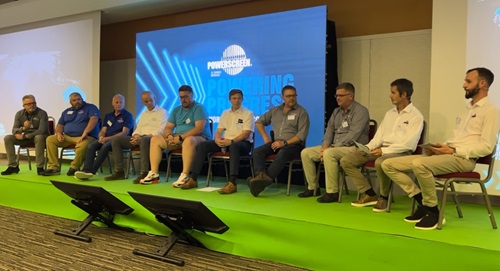
“What we want to do this year at [Terex MP] Dungannon is get a consistent [machine] build rate, removing all the noise around day-to-day work and consistently hitting our build schedule numbers. Once we have that firm base, we can grow even further. After two years of [COVID-19-induced] turmoil, the factory and its people need that. Efficiency is a big thing for us. About a year ago, we hired a new operations director at Dungannon, Conor Kennedy. He came from a Terex Group role with an operations focus. He’s been fantastic, showing great vision. He’s built a great team around him, focusing on improvement. They don’t say what they will do; they just do it and tell me what they’ve done. They’ve done a lot on digitalisation, for example. It’s created a much slicker operation.”
Launched in 1966 as County Tyrone-based Ulster Plant, Powerscreen’s founders championed the concept of mobile screening: taking the machines to the quarry face rather than the expensive process of moving the material to the machine. In 1969, Powerscreen exported its first machine to Sweden, which cost £2,500; by the 1970s, the Powerscreen name was born. In 2009, Terex Pegson and Powerscreen products and services were united under the Powerscreen name.
From its origins in supplying mobile machines in a sand pit, Powerscreen today offers more than 70 industry-renowned machine designs serving customers in the quarry, mining, construction, demolition, and recycling industries.
Five next-generation machines were unveiled at the Powerscreen World Dealer Conference in Varese. The Premiertrak 450 jaw crusher, the Trakpactor 480/480SR horizontal shaft impact crusher, the Warrior 1800X and Warrior 1200 Hybrid scalping screens, and the CT80R tracked radial conveyor. Speaking at the conference, Neil Robinson, Powerscreen product director, said Powerscreen is now also offering diesel-electric versions of the Titan 600 and Warrior 1200. Other planned crushing and screening machine introductions from Powerscreen over the next three years were also highlighted at the event.
So, how does Loughran evaluate Powerscreen’s machine range? “As I mentioned to our dealers during my presentation today, I think our machine portfolio is complete, perhaps too complete. When we compare ourselves to some of the competition, we have a much broader range. You have to ask, ‘Is that the right approach?’ By focusing on our core products, could we be more streamlined and cost-effective?”
Touching on Powerscreen’s Pulse telematics solution and the use of telematics by the brand’s dealers and customers, Loughran says: “I’m happy that we have a solution to be used, but I don’t think it’s being used as well as it could be, with customers and dealers tapping into its real potential for scheduling machine maintenance and fully understanding their equipment. It’s a case of educating dealers and getting them to supply key customer machine performance data to help us help them. Those who do fully use it use it well. Molson Group (Parent company of Powerscreen California, Powerscren Washington and Powerscreen Western), for example, has embraced it to plan costs and maintenance schedules and to know exactly what’s going on with their customers’ machines at any point in time. It’s a really good way to be.
“We use it [Pulse] to track machine running hours, a simple KPI [key performance indicator] that we check monthly to see trends. If we start to see machine running hours drop, we know that not as much sand, gravel or other material is being processed. Perhaps the demand for sand and gravel has dropped in that customer’s market, or there’s a [technical] problem. After several months, this warrants a conversation between our dealer manager and a dealer to determine what’s happening in that customer’s operation and the wider regional market. This helps us understand and react quickly if we need to. It also reassures our dealers that we always stay on top of what’s happening in their markets.”
As well as manufacturing its machines in its ISO9001:2008-accredited Dungannon, Omagh and Campsie facilities in Northern Ireland and at its site in Coalville, Leicestershire, England, Powerscreen makes machines at its custom-built facilities in Hosur, India, Jiading, China and Oklahoma, in the US. The brand also supports customers from many satellite offices and distribution centres in Australia, France, Mexico, and the US out of Louisville, Kentucky. Powerscreen also fully utilises a state-of-the-art Terex MP spare parts facility in Dungannon constructed in 2015, with cutting-edge picking and packing technologies ensuring excellent service to parts customers worldwide. The site has tens of thousands of stock items available for same-day dispatch.
“We already leverage our wide manufacturing footprint, which is critical given our huge [order] backlog and the need to lower shipping and wider costs,” explains Loughran. “There are challenges to that, such as you can’t really sell China-made machines into the US due to the 25% import duty, for example. We do sell China-manufactured machines to other parts of the world, though. The same goes for our India-made machines sold in the local market and to customers further afield. We also sell some India-made Chieftain screens and mobile conveyors in North America. We also recently acquired Marco Conveyors [based in Mount Vernon, Missouri], so more conveyor manufacturing for North American customers will be done there.”
Loughran says Powerscreen is investing in robotic machine chassis welding at its Dungannon factory. “This will start in Q4 this year and finish in Q1 2024. There’s been a lot of investment in upgrading the equipment at the site, including in plasma and laser cutting,” says Loughran. “Our factory team is delighted. It will allow them to do their best job and help retain people. There’s been a massive improvement across the Dungannon facility. That includes the new state-of-the-art, open-plan building for our office staff opening in the near future. It will again help retain talent and give our dealers a home to bring customers.”
Loughran is buoyed by many high-profile Powerscreen dealer network acquisitions, such as Molson Group, a leading UK equipment dealer, who recently added Arizona-based Powerscreen Western to its Powerscreen of California and Powerscreen of Washington portfolio.
“We are also seeing a second-generation of dealers coming through, such as at Lincom Group in Australia, with Roy Watterson, who sadly passed away a couple of years ago, being replaced as CEO by his son, Stephen. We have put a lot of work into dealer succession planning. It’s critical to us, and a downside of having such a long-established dealer network when you have highly successful dealer executives retiring or nearing retirement age. We are also moving away from having our dealer or territory managers based in Northern Ireland or the US and having them in the territories they represent, such as Felipe Ortega. Felipe is a former Komatsu dealer in Chile and has been working with Powerscreen for 13 years in that capacity. He is a strong, experienced individual, and we hired him three years ago as our Latin America sales manager to run that territory. Last year, he and his team generated impressive sales revenue in the region. Another example is Imran Kazi in the Middle East. He is based in Dubai, the United Arab Emirates, and covers the UAE, Saudi Arabia and Kuwait. Being in the territory and understanding the language and the culture is critical to succeeding.”
Where does Loughran see the biggest sales growth potential for Powerscreen? “We have made a substantial investment in Saudi Arabia, signing ALJ [Abdul Latif Jameel Machinery] as a dealer around 18 months ago. This is a strong, professional machine dealer with over 75 years of experience.
"Knowing the lay of the land in Saudi Arabia and having dealers on the ground is critical. There are a lot of big new infrastructure projects there, especially in the north, and ALJ is the perfect partner to help us exploit these opportunities."
In 2021, Terex MP purchased a new 18,000m² facility in the Jiading district of Shanghai to manufacture Powerscreen equipment, initially for the domestic China market. The brand entered China in 2016 in response to government investment in infrastructure and legislation supporting the use of recycled materials.
“China was a big market to go into. No matter the joint ventures and general sales we had tried over the years, we never quite cracked it. To be successful there, you have to be there,” explains Loughran. “Although the Chinese market has slowed, we’re building the factory up and producing machines there for customers in other parts of the world. We are well positioned for future growth in the Chinese market.”
Loughran continues: “In Eastern Europe, we’ve suffered from the Russia-Ukraine conflict, which has also impacted surrounding countries. Russia has traditionally been a strong market for Powerscreen, and now it’s just gone. We will go back and rebuild our dealers in Eastern Europe. We recently hired an Eastern European business development manager, who is currently based in Dungannon. He’s Lithuanian, speaks multiple languages, and worked on the factory shop floor before going into aftersales. He may choose to base himself in Eastern Europe in the future, but having him in Dungannon is still a real asset to us in serving customers in that market.
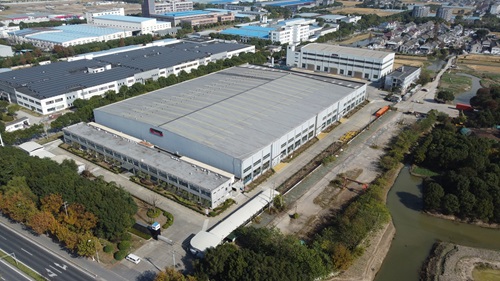
“Southeast Asia is somewhat of a blank canvas for us. And then we have strong dealers in other regions who are maybe not maximising our potential market share. For example, we might be doing well in screen sales but not so much in crusher and conveyor sales. We want to work with those dealers to maximise sales of all Powerscreen products. It should be low-hanging fruit where we already have strong dealers and service teams.
“One of the things I wanted to get right when I came back to Powerscreen was that the people who go to a customer site, be it a sales, applications or aftersales specialist, have to be what I refer to as ‘the sharp end of the stick’. If they go from a Powerscreen factory, the customer should expect that that brand representative knows their stuff. The customer may have dealt with a dealer, but now they know someone from the factory is coming. It should be the same expectation a Mercedes or BMW car owner has when they’re told that someone from the Mercedes or BMW factory is coming to see them and will sort the problem out. Many of our current sales teams are very technical, and we are training others to give them credibility.”
Asked about key global crushing and screening market trends, Loughran says Powerscreen is pushing its plant rental and rent-to-buy business. “A lack of plant availability over the last couple of years has depleted many rental fleets. Dealers were selling off rental units as they couldn’t get new machines. However, we are now seeing those rental fleets being replenished. For example, our Italian dealer, Impianti Industriali, is talking at the conference about how to deliver best practice in the machine rental business. They are fantastic and work closely with Terex [MP] to get finance and other support in place to secure agreements.
“In markets like the US, which has a big demand for rentals, rentals are repeat business, generating a constant revenue stream. The flip side is that you must have very strong rental service teams to support dealers. In the current climate, some customers are unsure whether projects will start or feel they could stop anytime. Given that, they are unsure whether to commit to capital investment. They may prefer to rent a machine for a few months. We see really strong rent utilisation across our dealer network, which is good.”
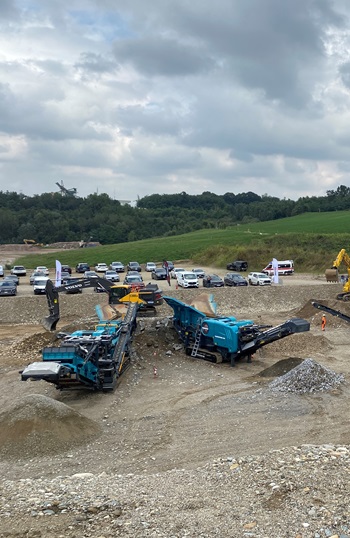
Loughran says there is also a global shift to off-highway machine manufacturers offering extended equipment warranties. “At this conference, we are delighted to be launching our new Powerscreen Protect initiative, which includes expanding our standard critical components warranty, as well as introducing a new reduced cost of extended warranty.”
Terex, CATAGEN and Wrightbus were recently awarded £6.27 million in funding by the UK Department for Energy Security & Net Zero through Phase 2 of the Red Diesel Replacement programme as part of the £1bn Net Zero Innovation Portfolio (NZIP).
The British Government funding is part of an £8.1 million project to decarbonise non-road mobile machinery, creating 15 highly skilled jobs and highlighting Northern Ireland’s manufacturing and engineering expertise that is now being used to reduce emissions globally.
The project will deliver a decarbonised end-to-end demonstration of a Powerscreen Premiertrak 450E crusher and Chieftain 1700XE screener powered by green hydrogen and e-diesel at a working quarry site in Northern Ireland in 2024. Specifically, the Powerscreen equipment will be fuelled by CATAGEN’s ClimaHtech E-FUEL GEN and COMPRESSOR technology, and Wrightbus is supporting the development of a mobile hydrogen refueller.
The aim is to develop this complete solution to a pre-production readiness level and demonstrate the full systems approach at two demonstration sites in 2024. The benefits of this concept lie in integrating well-proven equipment with innovative technology that can deliver a fully decarbonised, robust solution for the industry.
I am keen to hear Loughran’s thoughts on Powerscreen’s central role in the project. “This is a huge project for us and a significant element of our ongoing commitment to sustainability. We did something similar a couple of years back with the Warrior 600 when we put batteries on it. We tried to break the mould by showing that you can have battery-powered crushers and screeners, despite the machines being seen as too heavy-duty for batteries and unable to regenerate power like you can via the braking systems on loading shovels, trucks and dumpers. It means the lifespan of your battery and the amount of time you can run your crusher and screener is limited. That lack of power regeneration is a real problem regarding battery-powered crushing and screening. So, technological advances around clean energy coupled with very efficient battery-powered and electrical solutions are the only way it will work for us. This ambitious Red Diesel Project with CATAGEN therefore is critical. We are being trailblazers on this and setting out our stall that we’re not sitting back and accepting that it’s a set market, not just in terms of electrical machines but around new technologies.”
Expanding on Powerscreen’s approach to alternative-power-based machine operation, Loughran says: “A couple of years ago, we signed up Agder [Gruppen] as our dealer in Norway. Norway is heavily focused on electric and green energy, so the majority of what we sell to Agder are hybrid, dual-power or fully electric machines. That’s helped us further develop and push products, as did China, another electric-driven machine market. To compete there, we must have machines of that spec – not just for China but also to sell to the rest of the world. We make electric-powered models in Northern Ireland as well as China.”
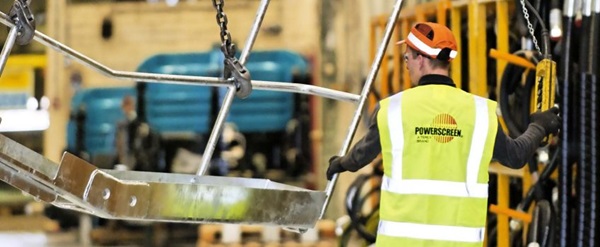
Loughran says that while there has been a notable increase in Powerscreen’s dual-power machine business in Europe, he feels more needs to be done to increase the brand dealer and customer knowledge and awareness of dual-power and fully electric models. “There might be a fear factor of moving away from diesel. ‘What does it mean to go into electric?’ Our machines have traditionally been heavy-duty diesel-hydraulic plants, with our dealer service teams used to dealing with mechanical issues – pumps, motors, and valves. When you add in electrics, controls, and automation, it can sometimes be concerning. As such, we need to develop our teams and our dealer network teams’ skill sets in hybrid and fully electric machines so they can better support customers. Once we’ve done that, we’ll see a significant increase in hybrid and fully electric machines used by European customers.”
The deployment of AI (artificial intelligence)--based solutions in the global business world has markedly increased. How does Loughran see Powerscreen using it? “Our helpdesk and aftersales teams are starting to use it. It provides quick access to key data. Our dealer portal and tools support their access to information from various devices 24/7. We are doing a lot of work to educate our dealers on accessing and using the data. AI will simplify this process, with dealers asking questions and getting quick responses [from an AI Chat Bot] via WhatsApp or another digital platform.”

